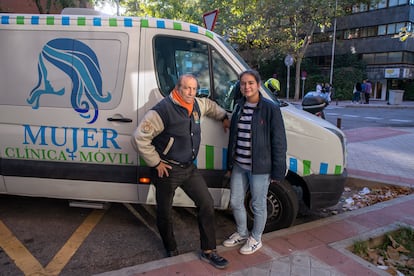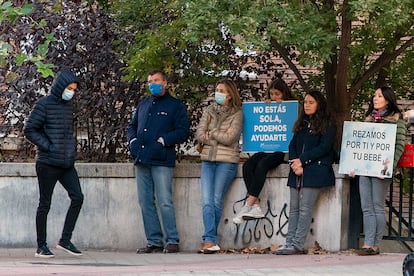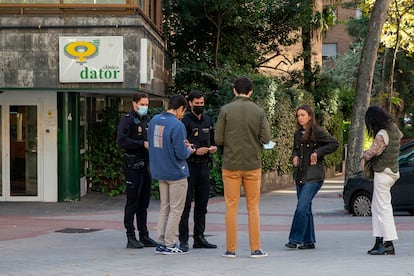The pro-life campaign to stop women from having abortions in Spain
Women who wish to terminate a pregnancy must contend with a barrage of harassment – from personal questions and targeted prayers to calls to get an ultrasound and outright abuse

Since time immemorial, the women who roll up at Madrid’s Dator clinic for an appointment have had to contend with a barrage of harassment before reaching the door. They are asked uncomfortable questions by young strangers; in some cases, they are insulted, or they are subjected to a chorus of prayers sent up on their behalf.
There was some respite on Sunday, October 31 when the anti-abortion group 40 Días por la Vida – the Spanish branch of the US pro-life organization 40 Days for Life – temporarily suspended their campaign. It will begin again in Lent in 2022. Sunday marked the end of 40 days of uninterrupted prayer in front of the Dator clinic, which in 1986, became the first private entity to be licensed to carry out voluntary terminations of pregnancies in Spain. These 40 days of prayer were happening simultaneously outside abortion clinics in places such as Barcelona in Catalonia, Cádiz, El Puerto de Santa Marìa and Córdoba in Andalusia, Pamplona in Navarre, Vitoria in the Basque Country and Valladolid in Castilla y Léon, according to the organizers of 40 Días por la Vida.
During this period in Madrid, groups of between three and 10 volunteers would gather in front of Dator clinic to pray every day from 9am to 8pm, advertising their presence with the help of posters and rosaries. According to their website, the campaign was divided into 1,039 shifts between 562 volunteers. Each shift had its own boss, or captain, who organized via the instant messaging service WhatsApp. “We have saved lives,” one such captain messaged proudly.
This organization is not the only one that shows up outside Dator clinic to put pressure on women heading to the center. They are joined by so-called “rescuers,” a team organized by Jesús Poveda, a doctor who pioneered the anti-abortion movement in Spain. The rescuers stand in pairs and have a mobile ambulance that carries out ultrasounds. Their approach is more radical. They have an instruction manual. “We have to stop all the women who come, even if they are not coming to have an abortion that day,” Poveda often says.
The objective is to try to detain the women who come to the clinic with the excuse of handing out an information leaflet. These women are then bombarded with questions, such as: What is your name? What are you doing here? Are you going to have an abortion? What do you need in order not to have an abortion? Are you sure about this?
If one of the women tries to avoid them, they will take two steps, either to the right or to the left, to stand in their way. The dance can go on for a while. Only if the women respond to the approach with shouts and insults are the rescuers advised to step aside. “Do not rise to the provocations of aggressive women who are going to have an abortion,” reads the text from Poveda’s guide.
To participate, each of the volunteers involved in Spain’s 40 Days for Life campaign had to register on the organization’s website and indicate when their vigil would begin and end. “This way the captains are informed that you are covering the shift and it is recorded,” states the registration page, which adds that the link should not be shared with anyone.
Rosaries
Volunteers hang rosaries of all colors and sizes on the tree on the corner of Hermanos Gárate street, in Madrid’s Tetuán district. The official version is that they are available for those who have forgotten theirs at home. The reality is that the rosaries are a reminder to anyone on this street of the pro-lifers’ presence. The posters change but the same dark blue logo is ever-present. One of the posters features a black and white sonogram of a fetus with the question: “What if I had your smile?”
Ana, 27, is among the pro-lifers. She is perfectly groomed and wears a headband and a white pearl necklace over her impeccably pressed collared blouse, corduroy pants and patent leather shoes. She has been going to this corner of Madrid to pray for as long as she can remember. Between prayers, she explains that her parents brought her here when she was a child and she has continued the tradition. She spends most of her free time volunteering: she says she helps out in nursing homes, takes food to the homeless and, in the mornings, if she gets away from work early, she goes to pray in front of Dator clinic.

“We’ve already rescued five. That’s good, isn’t it?” a volunteer says behind one of the posters. Ana downplays her response: “It must be very difficult to kill someone,” she says. Most of the volunteers fall between the ages of 25 and 35.
The prayers can be heard from the windows of the clinic, says Sonia Lamas, a spokesperson for the Association of Accredited Pregnancy Termination Clinics (ACAI) who works at the Dator. It’s always the same refrain: “Our Lord died. Many of His children have died with Him. His passion is relived with every baby being aborted, one every 20 seconds in our country. May all our brothers and sisters killed by abortion rest in Christ’s peace and be saved by His cross.” The prayer is shared on 40 Days for Life’s social networks.
Every night a WhatsApp group is created for the volunteers praying the following day. In it, instructions are given.
– I am Mercedes and I will be your captain for the day. I am here to help you. See you tomorrow to save lives.
– I would like to know, if a girl approaches, who to refer her to, if there’s a phone number or anything? writes one volunteer.
The group is also used to share photos of volunteers praying as well as the prayer book. In addition, there are comments on the shift: “What a good day we are having,” Mercedes wrote during her day as captain.
At 10pm, before eliminating each WhatsApp group, the same message appears, a sort of slogan: “This is the beginning of the end of abortion in Spain,” referring to a right that was established in 1985 and extended in 2010.
Convinced that this is the beginning of the end, Rosario, 36, has been showing up every day throughout the 40-day campaign. She is unemployed. “Since we started here, our prayers have meant fewer women are coming,” she says. “Saturday is the best day because more groups come and things get livelier,” she adds, as if barely aware that she is part of an anti-abortion corporation.
Created in 2004 in Texas, the 40 Days for Life anti-abortion pressure group is led by the media personality, Shawn Carney, an anti-abortion voice that has become almost omnipresent on conservative TV channels such as Fox in recent years. In 2007, the organization began to spread throughout the US and now has branches in more than 1,000 cities in 64 countries.
It is a fully-fledged multinational with the capacity to shoot its own documentaries and produce its own propaganda. Led by a team of executives with Carney at the head, it has also received the explicit support of former US president Donald Trump, who found the time to send them a couple of letters encouraging their efforts.
The power wielded by 40 Days for Life can be distilled into the boast of having prevented 19,000 women’s right to abortion across the world. “When a person wants to organize a campaign in their city, they register on the official 40 Days for Life website and agree to abide by the campaign rules,” says Victoria Campillo, a press officer for the organization. “If we have any problems, we contact them and they guide us.”
Poveda and the “rescuers”
Meanwhile, the “rescuers” have their own system, elaborated over 40 years by Dr. Jesús Poveda, the founder of Rescate (or Rescue), a school in Madrid that is dedicated to approaching all women who want to have an abortion. Each “rescuer” receives guidance that includes a training manual complete with objectives and risks. The guidelines state that “the rescuer’s objective is to offer the woman a last chance to reflect before making the decision.” The document also warns of the risks involved in approaching the women. “You may be ignored, rejected and even insulted or assaulted, both by the people who come to the center and by the center’s workers.” The manual claims these workers consider abortion a “business that they don’t want to lose.”
Abortion clinics such as Dator, which have been operating in Spain since the 1980s, carry out most of the voluntary terminations of pregnancy from the public system. Although Spain’s 2010 abortion legislation outlines that it should preferably be the public health system that ensures women can exercise this right, shortcomings in the system have meant this is often not the case.
Consequently, the vast majority of women who decide to have an abortion go to these clinics. The pro-lifers who try to overturn their decision can successfully hassle a woman into allowing herself to be guided to the ambulance, strategically parked a few meters away. There, an ultrasound will provide the woman with an image of her child and Poveda will invite her for a coffee to talk about their situation. Trusting the doctor in front of them, several of these women will forget that Dator clinic has asked them to come for the procedure on an empty stomach. Once they have had that coffee, it’s mission accomplished for Poveda and his rescuers: the woman will no longer be able to have an abortion, at least on that day.

Poveda admits that his approach has changed over the years. “Before, I was more anti-abortion, more aggressive,” he says. “Once, I even took camels and coffins to the entrance of the Dator. Now I am more pro-life; I try to help women not to abort.”
But, according to José Antonio Bosch, a lawyer specializing in abortion rights, “The fact that women have to see people praying with a sign that alludes to their privacy, or have to receive pamphlets where they are misinformed and told that they are going to kill their babies, is violating the Law on Sexual and Reproductive Health and Voluntary Termination of Pregnancy, as we understand it.”
In an attempt to curb the harassment, Congress in September agreed to consider an initiative to change the Penal Code and make “the harassment or the restriction of the freedom of a woman who intends to exercise her right to voluntary termination of pregnancy” a crime punishable by up to one year in prison. The plan from Spain’s Equality Ministry also aims to regulate conscientious objection, guarantee access to abortion in public hospitals throughout Spain and allow 16- and 17-year olds to abort without parental consent.
“We are surprised that people who are just praying are a reason for the machinery of the legislative power to be set in motion,” says Campillo. “Our presence allows the women to fully exercise their right to choose and choose their child’s life.”
When Estefania, 35, arrived early Saturday morning for her abortion at Dator, she was a bundle of nerves. The day before, doctors had informed her that her baby had a congenital malformation incompatible with life: at 20 weeks, she had to have an abortion or risk her life for a baby who had no chance of survival. As all the doctors were conscientious objectors in her own hospital – clashing with current legislation – she was referred to Dator where a man and a woman stood in her path. “Think about how lovely it is to have a child, to give birth to a new life,” they told her. Such was the shock, neither she nor her partner could respond. “No one has the right to reproach anyone, especially not at the entrance of a clinic,” says Estafania. “These groups don’t distinguish, and they don’t care about the trauma they cause.”
Saturday is the day when the harassment is at its worst. Parked in front of the clinic are the ambulance and the rescuers while on one side of the street, 40 Días por la Vida volunteers are busy with their prayers. On the other side, a man dressed in military attire, a hat adorned with the Spanish flag and 10 bracelets from the far-right party Vox on each wrist, offers his particular brand of support to the cause, directly confronting some of the women trying to reach the clinic, insulting some as they enter.
Tu suscripción se está usando en otro dispositivo
¿Quieres añadir otro usuario a tu suscripción?
Si continúas leyendo en este dispositivo, no se podrá leer en el otro.
FlechaTu suscripción se está usando en otro dispositivo y solo puedes acceder a EL PAÍS desde un dispositivo a la vez.
Si quieres compartir tu cuenta, cambia tu suscripción a la modalidad Premium, así podrás añadir otro usuario. Cada uno accederá con su propia cuenta de email, lo que os permitirá personalizar vuestra experiencia en EL PAÍS.
¿Tienes una suscripción de empresa? Accede aquí para contratar más cuentas.
En el caso de no saber quién está usando tu cuenta, te recomendamos cambiar tu contraseña aquí.
Si decides continuar compartiendo tu cuenta, este mensaje se mostrará en tu dispositivo y en el de la otra persona que está usando tu cuenta de forma indefinida, afectando a tu experiencia de lectura. Puedes consultar aquí los términos y condiciones de la suscripción digital.









































